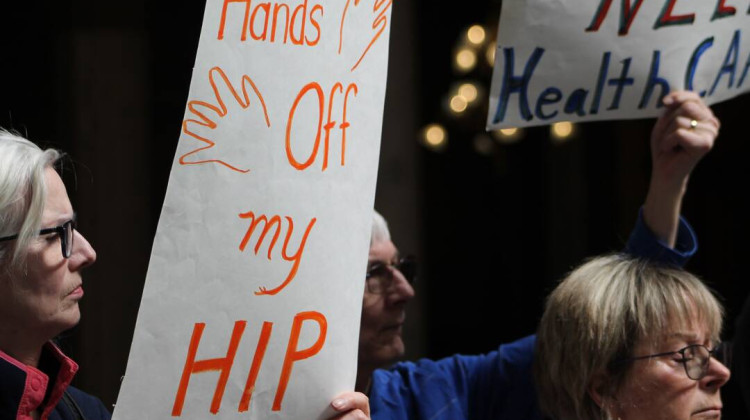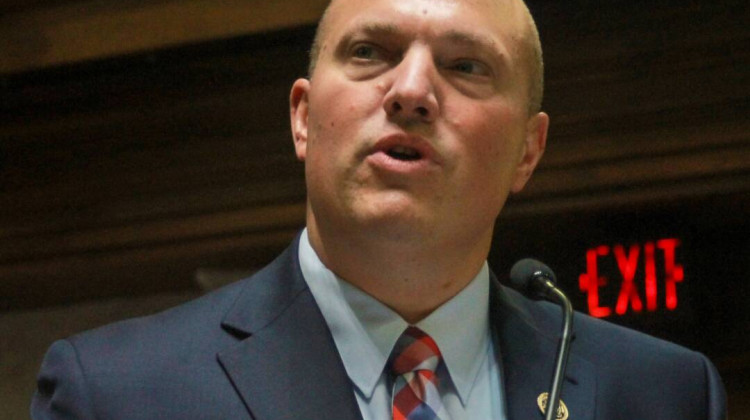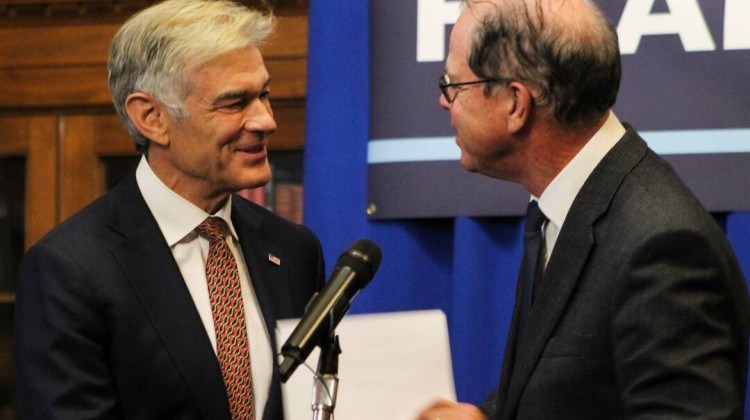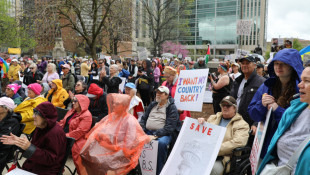
Sen. Michael Crider (R-Greenfield) speaking at New Direction Church during a rally organized by the group Faith In Indiana to urge lawmakers to fully fund Senate Bill 1.
Farah Yousry/ WFYIIf you or someone you know may be considering suicide, contact the 988 Suicide & Crisis Lifeline by dialing 9-8-8, or the Crisis Text Line by texting HOME to 741741.
Hundreds of Hoosiers rallied at the New Direction Church in Indianapolis Saturday to urge lawmakers to fully fund Senate Bill 1, which would bolster mental health care access and services across the state.
The bill, authored by Sen. Michael Crider (R-Greenfield), has bipartisan support. It unanimously cleared a Senate committee last week, but only after its funding was stripped. SB 1 originally included $30 million for an expanded mental health crisis response system –– an amount already far below the $130 million that the Indiana Behavioral Health Commission suggested is needed to address Indiana’s growing mental health crisis.
“We are here to call on our lawmakers to fully fund SB 1,” said Faith In Indiana’s Anthony Harvey.
Advocates were joined by dozens of faith leaders, lawmakers and city representatives as the Indiana Senate prepares to discuss the bill Monday afternoon.
“What brings us all here today is the recognition that this issue impacts our entire state, not just the city of Indianapolis,” Indianapolis Mayor Joe Hogsett said. “Every demographic, every background can be affected. That is what motivates a groundswell of support for widening access to care.”
Community advocates said that SB 1 without funding would be toothless in the face of a growing crisis in Indiana which continues to supply a mental health to jail pipeline.
“[If] we don't marry up the money, my name is going to be on a bill that does not half as much as it could do and I don't want that to happen,” Crider said.
Powerful testimony

As a veteran, Rick Moscrip and his closest friend returned to the United States after years of military service. They were face-to-face with their mental health struggles. His friend had a crisis and police responded and sent him to jail. He died by suicide inside the jail cell.
Moscrip said he has struggled and last year felt that “life was no longer worth the effort”. In crisis, he called the Veterans Affairs hospital for help.
“I called the VA for help, a hospital not 911. I explained the situation to the crisis operator when she asked. I told her I have two long guns and they were cased and padlocked. The VA sent police officers to my home where they found my weapons still locked safely in their cases,” he said.
Still, Moscrip said, his 13-, 10- and 4-year-old children had to watch police take their father away, shocked and confused at how things spiraled.
“It's just another combat veteran feeling stereotyped and ashamed, along with the confusion and fear that my children experienced added another layer of trauma,” he said.
When he eventually got the help he needed, he said, “it worked miracles.” Moscrip said he recognizes that he’s one of the lucky ones.
Jodie Moser’s brother, Adam, suffered from mental illness –– alcohol abuse, depression and anger management. When he was in crisis two years ago, threatening to kill himself, his wife called 911 desperate to help him. Moser said police showed up at Adam’s house outside Jacksonville, Florida and an officer shot and killed him.
“Our system is broken. And something has to change. Our calls for help deserve to be heard” she said.
Tarsha King from Gary, Indiana said she attended the event because she’s seen her sister’s grueling and ongoing struggle with mental illness. When her sister is in crisis, cops are usually the ones to respond. And that has almost never helped her.
It wasn’t until her sister was locked up in jail that she was referred for specialized help.
Charity Hurst, who has sons with autism, started a nonprofit called Youth Empowered Inc. to ensure that children have access to safe mental health services and support. She said when her son would suffer an autism-related “meltdown” in public, she was typically advised to call the police. But she knew that would only worsen the situation by making him fearful. She said there needs to be a reliable, accessible non-police response system.
“And it's not because we have a lack of respect for our first responders. But it's because maybe they're not fully equipped. And we need people that have been trained and know, like therapists do, how to help our children,” she said.
A growing crisis
Saturday’s rally was organized by the Faith In Indiana group to kick off its “Call For Care” campaign, urging lawmakers to fully fund SB 1. Advocates want a statewide crisis response system that would provide everyone in a mental health or substance use crisis a number to call, someone to come and a safe place to go.

In its original form, the bill’s funding would be funneled into mental health crisis mobile response units and clinics and to sustain Indiana’s 988 mental health crisis hotline. The federal government pumped money to scale up the hotline across the country in October 2022. But there is no sustained federal funding; it will soon be up to each state to keep it sustainable. Indiana’s Family and Social Services Administration estimates that 988 and the system around it would need nearly $130 million every year.
Now that SB 1 has been stripped of money, its funding will be contingent on the state budget debate. This concerns mental health advocates across the state as the crisis continues to swell. Some law enforcement officials are calling for an overhaul of the system which has turned some jails into “pseudo mental health centers,” said Boone County Sheriff Mike Nielsen.
According to a report by Indiana Behavioral Health Commission, nearly a quarter of police shootings in 2015 involved a mental health crisis. While 37 percent of people in state prison and 44 percent in jail have been diagnosed with a mental illness.
According to Mental Health America, Indiana has the 11th highest prevalence of mental illness among adults in the U.S. One in five Hoosiers lives with mental illness, according to the commission’s report. It's estimated that untreated mental illness costs the state more than $4 billion annually.
Another bill this legislative session, HB 1006, aims to create a system for law enforcement to refer people to mental health centers where they would be assessed by a mental health professional within 48 hours and scheduled for a hearing no more than 24 hours later in front of a judge.

“This is a landmark moment,” said Cindy Hesemann, a member of the Interfaith Action Network.
She said that the Indiana Behavioral Health Commission has adopted a crisis model that, if implemented, would ensure that people in crisis have a safe place to go. But without funding, SB 1 will be akin to a new, shiny car with no engine.
“So will you join me today in answering the call for care? Because mental health is not a partisan issue,” Hesemann said as she addressed the lawmakers in attendance.
Indiana Public Broadcasting's Brandon Smith contributed reporting.
This story comes from a reporting collaboration that includes the Indianapolis Recorder and Side Effects Public Media — a public health news initiative based at WFYI. Contact Farah at fyousry@wfyi.org. Follow on Twitter: @Farah_Yousrym
EDITOR'S NOTE: The language in this story was updated to reflect best practices in reporting on suicide. We've also added information on how to contact the National Suicide Prevention Lifeline.
 DONATE
DONATE





 View More Articles
View More Articles


 Support WFYI. We can't do it without you.
Support WFYI. We can't do it without you.